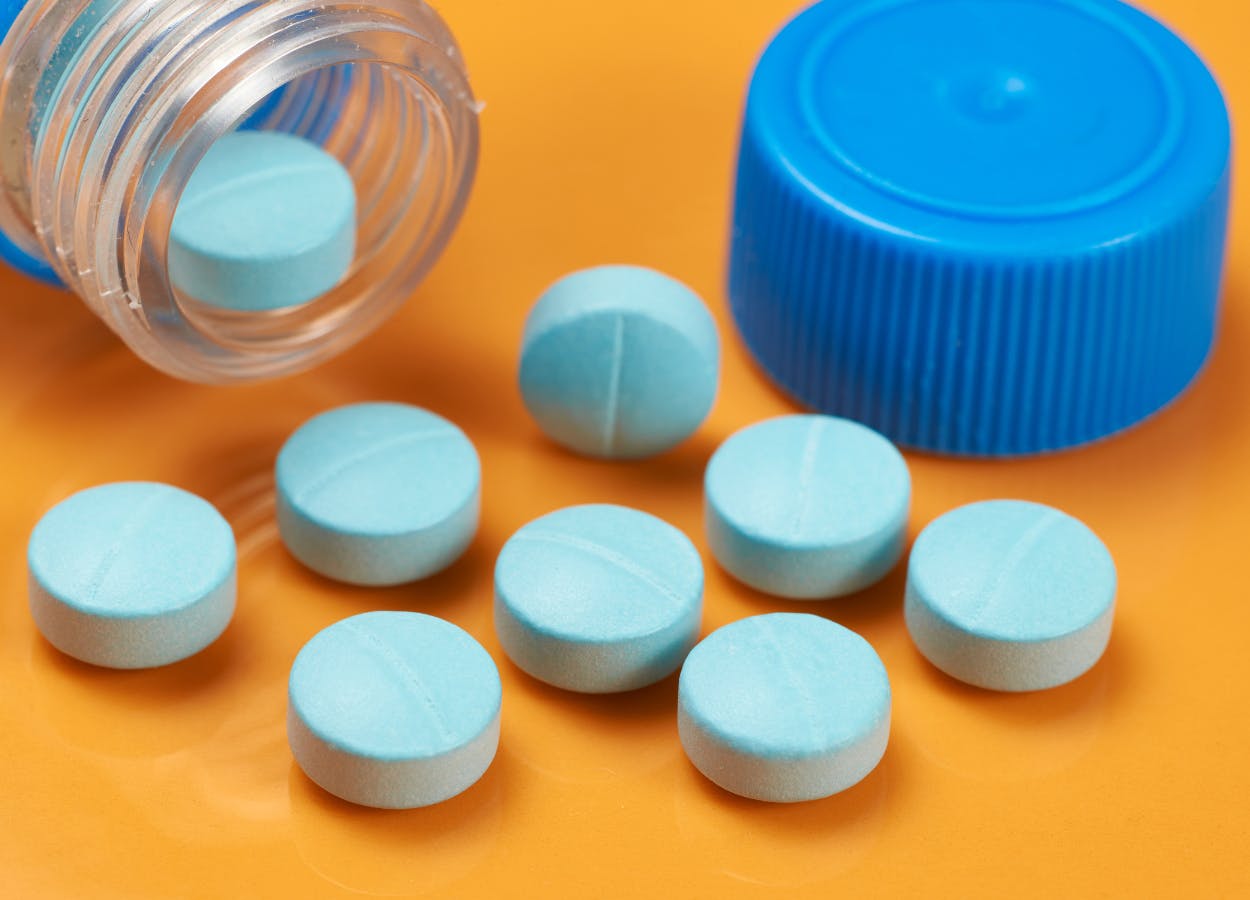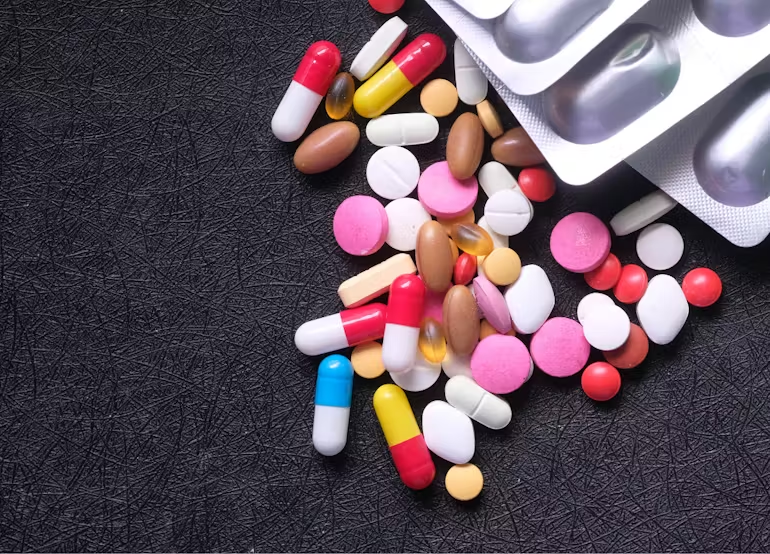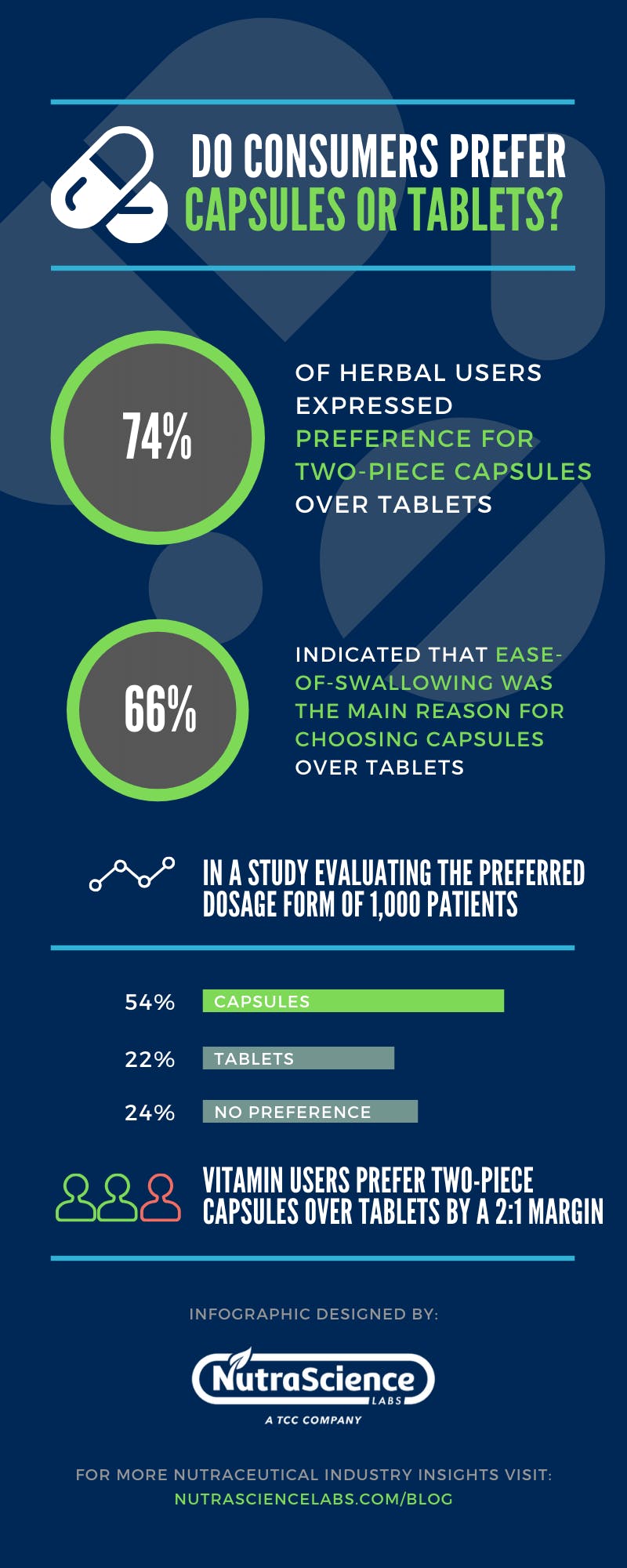What’s the difference: capsules vs. tablets (and caplets)?
As an online pharmacy, we’re here to help you shop medicines and supplements with confidence – and we’re proud that more than 20k reviews say we’re doing it right.
That’s why we’re talking about the nitty gritty of everything you need to know when it comes to medication, such as the difference between the two most common kinds: capsules and tablets (which also includes caplets, a slightly different form of tablets).
Capsules, tablets and caplets all have their benefits, and there’s quite a few differences in terms of efficiency, pricing, manufacturing and ease of use.
But before we get into those details, let’s start with the definitions of tablets, capsules and caplets.
What are tablets?
A tablet is a hard form of medication containing one or more active substances, obtained generally from compressing a volume of particles for oral use (so you can take them by mouth).
These are the most common type of pills because they’re safe, cheap and very easy to use.
What are caplets?
Caplets (sometimes called film-coated tablets) are similar to tablets, but are coated with a film or gelatin to hide the taste and make them easier to swallow. They tend to be more sensitive on the stomach than tablets. They're less common than tablets or capsules.
What do tablets look like?

Tablets are often produced with extra substances in addition to the active ingredient. These substances hold the pill together and also enhance the texture or flavour.
Tablets can be made into round, oblong, or disc forms, and some may have lines running through them to make them easier to split in two (if a half dose is an option).
What are capsules?
The capsules are pharmaceutical forms intended for oral use, consisting of a shell of gelatin or other materials normally filled volumetrically with the active ingredient and excipients (inactive ingredients such as colouring agents, fillers or preservatives).
According to Wikipedia, capsules are "solid medicines with hard or soft shells of various shapes and capacities, usually containing a single dose of active ingredient."
What do capsules look like?
Capsules are oblong in look, and they have a shell outside. They can be separated by pulling them apart gently (but they aren't often intended to be), and can be one colour or each half can be different colours. There's a set amount of medication inside, so you can't take a half dose by pulling them apart like you can with tablets.

What are the main differences between tablets and capsules?
Tablets can be in many different shapes and sizes, while capsules are always oblong. Tablets have a longer shelf life than capsules and can contain higher doses of their active ingredient. However, capsules will usually disintegrate more evenly in your stomach, meaning that they'll get to work faster and much more of the dose will be absorbed.
Advantages of capsules
1. Easy to digest
Vegetable cellulose capsules break down much more easily in our digestive tract than tablets. This is because cellulose is a natural plant fiber, made up of simple molecules that respect the intestine. The easy breakdown means that the active ingredients inside the capsule are easily absorbed by the body.
2. Avoids unnecessary additives
Unlike tablets, capsules don’t require the addition of binders to hold them together. Binders can be more difficult to digest, so it could be better to avoid them.
3. Capsules can help improve bowel movements
Vegetable cellulose has a structure similar to that of starch. Since your body doesn’t produce the enzyme necessary for the digestion of cellulose, it passes through the digestive tract and reaches the large intestine. There, cellulose is consumed by your gut bacteria, which helps that bacteria to thrive and keep us healthy.
4. Less processing
The tablets have to go through a heating process to bond together. Increasing the temperature can damage the vitamins in the supplement, reducing the overall concentration of nutrients. The capsules, on the other hand, are not exposed to heat sources during production.
5. Suitable for vegans
Some capsules and tablets on the market use products of animal origin. Cellulose, however, is a plant fiber, perfectly suited for vegan diets.
What is more expensive: tablets or capsules?
According to Healthline, capsules are generally more expensive than tablets, for a few reasons.
First of all, the low cost of production makes tablets accessible to users. Time from production to delivery is 5x higher for capsules than tablets, which raises the costs of capsules.
Secondly, tablets can last longer on shelves and in shops, while capsules need to be consumed relatively quickly before they expire.
Efficiency differences
When taking supplements, it’s important to look for products that provide maximum bioavailability to the body. This means supplements should be available to the body for making an effect as efficiently as possible.
Capsules are known for entering the bloodstream much faster than tablets. This makes them more efficient and also more costly, as we have seen above.
On the other hand, because they cannot be broken in half or crushed like a tablet, capsules are quick-acting, flavourless, and tamper-resistant.
Manufacturing differences
Capsules are often simple to create since, unlike certain other types of drugs, they don’t call for complicated formulas. Literally, a capsule is ‘a little case or container.’ These capsules often have liquid or powder inside of a shell-shaped container.
Creating a capsule has a number of drawbacks as well. It can be challenging to put more of the active ingredient into a capsule than a tablet, since there is a restricted fill weight dependent on the capsule’s capacity.
Additionally, variations in fill volume might happen, which makes it challenging to guarantee accurate measurement of the medication filling.
One last manufacturing difference is that tablets preserve the components from things like oxygen and light, and have a longer shelf life than capsules.
Ease of use
From a nutritional perspective, it’s common knowledge that capsules are easier to swallow than tablets. Additionally, capsules have no flavour, which makes them easier to take, too.
A capsule, however, can’t be divided into two like a tablet can.
In a study conducted by Capsugel for NutraScience Labs in 2009, these findings emerged:
- Although consumers still mostly utilise tablets as their preferred solid oral dose form, capsules and liquid-filled gels are rapidly gaining appeal.
- While speed of action and softness on the stomach are becoming more significant, consumers continue to rank ease of swallowing as the most essential feature.
- "Easy to swallow" continues to be strongly associated with capsules as the best quality.
Credit: NutraScience Labs, 2009.
Are tablets or capsules more common?
At medino, we stock almost the same number or tablets as capsules. Caplets are quite rare:
| Formulation | Products |
|---|---|
| Capsules | 1227 |
| Tablets | 1223 |
| Caplets / Film-coated tablets | 70 |
Our product information always tell you if a product is a tablet, capsule or something else. If you prefer one or the other, you can easily search for only one of them. For example, search for ibuprofen capsules to only show capsules.
FAQs
What happens when you open capsules or smash tablets?
Crushing pills or popping capsules to release the liquid isn’t always recommended.
By doing this, you change how the medication is absorbed by your body. Although uncommon, it may lead to either not receiving enough medication or receiving too much.
If tablets with a specific coating designed to prevent stomach disintegration are crushed, the coating may allow absorption in the stomach. Underdosing and other problems could result from this.
Extended-release medications increase the risk of overdosing if you take them faster in this way. The active component may release instantly rather than gradually if you tamper with the tablet.
But some capsules (like probiotics) do offer the option of opening them and sprinkling them over your food or in your drink. Read the directions carefully to check first.
What are the risks of capsules or tablets?
Tablets and capsules both carry a small risk.
Tablets sometimes include more components than capsules, which might raise the risk of sensitivity or allergy.
Most pills also include additives. Soft gels typically include more artificial components than hard-shelled capsules, which have less additional ingredients.
Why do capsules absorb faster than tablets?
Since capsules are more readily absorbed than tablet tablets, they start acting more quickly.
This is due to the fact that before the body can start to break down and absorb nutrients, they need to be suspended in a liquid of some kind first.
Conclusion
Capsules and tablets might present some differences and similarities, but their popularity is due to their efficiency and how quickly they work.
While capsules are more popular than tablets and the most common type of medication prescribed, they’re also more expensive.
Speak with your doctor right away about modifying your medications if you are unable to take tablets due to a medical illness or psychological issue. There are lots of other options out there, including capsules – or even liquid forms or spray forms.
Now you know the differences between capsules and tablets, do you know what you need? We’re ready to deliver… just order before 8pm and we’ll get your capsules or tablets to you tomorrow with next day delivery options.


